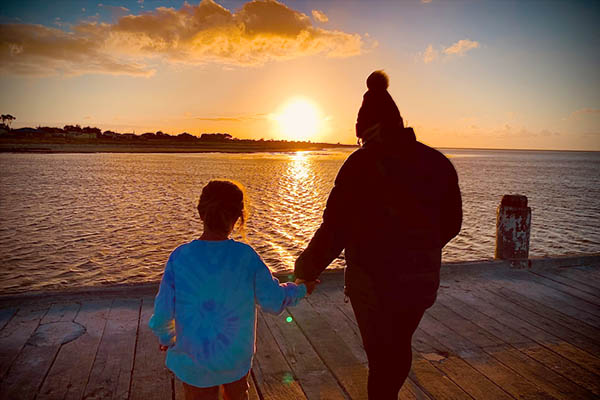If I was speaking to my teenage self, I would give her a big hug.
I’m only 40, so it really wasn’t that long ago. But periods and endometriosis weren’t spoken about. I didn't realise my experience wasn’t right or normal.
My endometriosis symptoms started when I was 15. I had painful and heavy periods, fatigue, rectal pain and bleeding with my period, painful bowel motions and bloating.
At school, health information was mostly limited to preventing pregnancies. Looking at it now, it was the hardest thing I ever had to do as an adult – try to get pregnant and start a family.
It’s hard to go to a doctor and advocate for yourself at 15. I probably would have told my parents a lot more of what was going on, but I really thought it was normal. That my heavy periods and needing time off school, or being curled in a ball in absolute agony after PE class was normal.
That's why I'm pretty vocal now in helping young people [with endo], or people who have come to me and asked questions. I’ve actually passed the Epworth endometriosis guides to people I know who are in the diagnosis stage.
How endometriosis affects me today
I love to spend time with my husband and two kids. I live on Wadawurrung Country, on the Victorian Surf Coast, and we love spending time by the ocean. If we're not in the water, we're usually down on the beach or camping.
Endometriosis, and my recent adenomyosis diagnosis, still affects my life. There were times I wasn’t able to leave the house because it was so bad. My period was so heavy.
My main thing is fatigue every day. I wake up in the morning and feel tired, even though I’ve slept very well. I still experience bowel and IBS-like symptoms, depending on what I’ve eaten.
I work part-time and would love to work more, but I just can’t. It’s something I’ve had to accept and manage.
It’s funny, because people will say, ‘oh you’ve had your surgery, you must be better now’.
But endometriosis is a chronic condition, people need to understand it’s not like having a broken arm.
What I’ve learned about pacing, choosing my care team, and exercise
You find ways of managing it better. I know which foods to avoid, or certain exercises that will trigger pelvic pain for me. I’ve gotten good at pacing my energy. If I have something bigger on tomorrow, I’ll take it a little bit slower today and not clean the entire house and be wrecked for the next day.
I am really empowered that I’m the centre of who makes the decisions.
I think that’s important for people who have any type of chronic illness, to find a care team that supports you in what you want to do. You always have choices about the treatment and the management you use, and also the health professionals you work with.
I recognise that every person with endometriosis is different. That’s probably why it’s so hard to manage and treat. What works for me may not work for the next person.
Movement for me has been a huge thing. In the past, if I wasn't feeling well, I would stay in bed all day. Whereas now, regardless of how I feel, I get up and have a shower, get dressed and then try and go for a walk.
My mental health is deeply affected after surgery, and movement has really helped. Even if it is a walk down the end of my street, it gives me that sense that I can still do things, even on my hardest days.
Remember to be kind to yourself
I think anyone with endometriosis can relate to that feeling of guilt and like you’re letting everyone else down. Don't beat yourself up over it, because sometimes you just can't control it. It’s just the nature of the beast, it does what it likes – and usually when you’ve got something on!
About endometriosis
- What is endometriosis
- What causes endometriosis
- What are the symptoms
- What are the risk factors
- Myths surrounding endometriosis
- Epworth Endometriosis Patient Guide

